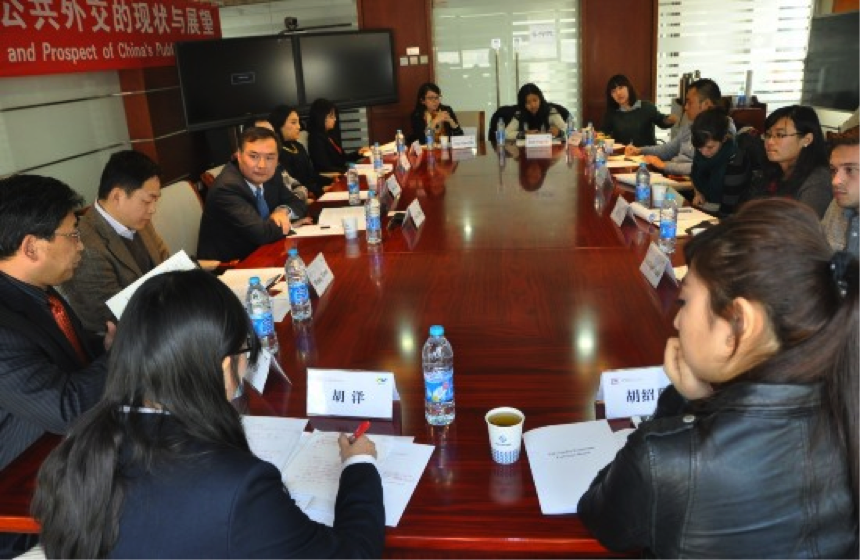In July 2015, Dr. Nancy Snow was named Professor Emeritus of Communications at Cal State Fullerton after an early retirement as Full Professor. This was her highest honor to date, but then in September 2015, she...
KEEP READINGThe CPD Blog is intended to stimulate dialog among scholars and practitioners from around the world in the public diplomacy sphere. The opinions represented here are the authors' own and do not necessarily reflect CPD's views. For blogger guidelines, click here.
MPD In China 2013: Roundtable at The Charhar Institute
APDS Blogger: Shaocong 'Amanda' Hu
On Jan. 19th, the USC MPD Beijing Delegation attended a roundtable themed “The Present Situation and Prospects of China’s Public Diplomacy” sponsored by the Charhar Institute, a leading public diplomacy and international relations think tank in China.
The roundtable began with remarks by a group of exceptional Chinese public diplomacy practitioners and scholars and followed with an hour-long discussion session. Zhang Ping and Shen Xin, two former diplomats, currently Vice-president of the Chinese People’s Institute of Foreign Affairs and Secretary General of the China Friendship Foundation for Peace and Development, respectfully, analyzed critical differences between PD efforts by the U.S. and China, revealing problems in wielding PD tools and other obstacles that Beijing is confronting. Wang Yiwei, from Renmin University of China, and Liu Chen, from Beijing Foreign Studies University, introduced ‘PD with Chinese characteristics’ and China’s international image building, respectively.
The hour-long discussion session focused on more case-related issues. One of my colleagues, Frank Cheng, asked how China intends to change its image. Beijing has made numerous efforts to reach out to the international community, such as its publicity video in Times Square, but has only received minimal feedback from the U.S. public. Zhang observed that it would take time for Beijing to make further progress, and required more participation by those who care about China.
 Members of the MPD delegation meet with academics and practitioners at the Charhar Institute
Members of the MPD delegation meet with academics and practitioners at the Charhar InstituteAgainst the backdrop of a disputed island between China and Japan, I wondered how might public diplomacy help with the tense relationship. In response, Shen said that public diplomacy efforts mainly work through people-to-people exchange, as opposed to direct exchanges by government agencies. Zhang added that the final say [in disputes] occurs at the government level. In regards to the issue with Japan, interestingly, Shen brought up the term “quiet diplomacy”, as Beijing’s solution to stabilize the bilateral relations.
Discussing the present situation and prospects of China’s public diplomacy, the experts expressed their optimism conservatively, recognizing that efficient national campaigns like Confucius Institutes, Beijing Olympics, Shanghai Expo and others help. However, PD’s value or benefit for contemporary China is limited; as Shen indicated, because public diplomacy is only an effective tool towards a country with which China is not actively involved in a dispute.
Shaocong 'Amanda' Hu is a second-year graduate student in the Masters of Public Diplomacy program at the USC Annenberg School for Communications and Journalism, with a particular academic interest in nation branding, cultural diplomacy and public diplomacy in East Asia. She is the intern researcher at The Charhar Institute and co-researched on China’s Overseas National Image with China International Publishing Group in the summer of 2012. Meanwhile, she works as the deputy chief editor of The Charhar Newsletter, the national flagship E-journal on Public Diplomacy and International Relations.
Shaocong is an honor graduate from the Beijing Institute of Technology with Bachelors degrees in English and Law. Serving as am editor at CCTV News for one year, she understands the significance of international broadcasting as well as discourse power development. In her spare time, Shaocong polished her interpretation and translation skills by working for the Canadian and Australian Embassies.
Visit CPD's Online Library
Explore CPD's vast online database featuring the latest books, articles, speeches and information on international organizations dedicated to public diplomacy.
POPULAR ARTICLES
-
January 29
-
January 20
-
January 28
-
January 2
-
January 8
Join the Conversation
Interested in contributing to the CPD Blog? We welcome your posts. Read our guidelines and find out how you can submit blogs and photo essays >.













